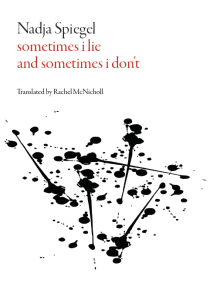Tr. by Rachel McNicholl
Austrian author Nadja Spiegel’s debut collection of experimental short stories, Sometimes I Lie and Sometimes I Don’t, describes individuals struggling to retain their senses of individuality. In the coy story, “lisa and elias and me,” Ines involves herself in a casual sexual relationship with the same boy on whom her best friend crushes. She reasons that keeping her romantic affair secret is a form of loyalty to her friend’s happiness. Like most of Spiegel’s narrators, she resists attachment out of a desire to remain unfeeling. She affects nonchalance concerning Elias’ inattention. One begins to feel that her record of events is not just unreliable but overly forgiving on her own questionable decisions. There is also much self-abasement as a form of deflecting others’ acts of unkindness. This is in keeping with the young narrator’s knowing voice, one that is convinced of its own prescience. But her own jealousies emerge as Elias returns Lisa’s advances: “Sure he is, I say. Maybe he really is that kind of guy, I add and bite my tongue before I say the kitchen belongs to me. But what use is a tongue anyway? I’m not the kind of girl who needs a tongue; I’m not the kind of girl who has anything to say.” Here, Ines’ habitual diplomatic handling of Lisa’s innocence almost gives way to the articulation of her own possessive feelings about Elias. Ines is an unromantic lover for Elias’ convenience and for fretful Lisa’s sake, a believer in Elias’ dutiful courtship. But in truth, she is neither. She knows that among company, she is a sham. There is always the sense that Spiegel’s narrators are learning and relearning the rules of propriety; that they are struggling to negotiate public expectations. For this reason, her characters are hapless misfits, loners, or drifters. In the public sphere, they are forced into roles.
Among the protagonists in these fictions, most of the characters in orbit seem to happily admit all their duplicity as necessary role-playing in a dishonest world. By the story’s conclusion, Ines has managed the acting without consequence to either party. More importantly, she has also clung to her sense of herself as a girl who enjoys being romanced but understands that at her age, most boys’ attentions will be shallowly motivated. She deftly slips into roles and lucidly perceives the wants of others. Her confession, “Sometimes I lie and sometimes I don’t” is her recognition of this deftness. But Elias denies her the same tokens of affection he freely awards Lisa. The tragedy is that she craves approval from Elias against her knowledge that he cannot give her the profound sort of love that she desires. She understands “Elias is not the kind of guy who falls in love. He only loves, for instance.” Ines’ isolation, one of the necessary trials of adolescence, is more keenly felt because of her heightened sense of awareness.
The daughter-narrator in “how we forgive” also suffers from a sense of loneliness when the pieties afforded to the dead threaten a truthful commemoration of her mother. Spiegel complicates questions of decorum by suggesting that the girl accidentally caused her mother’s death while she was at the wheel. “how we forgive” is a story that seems to have been penned by the narrator in a precarious state of emotional instability. The self-consciousness typical of adolescence has been carried to a state of paranoia. Even the most mundane detail recalls to her the scene of her mother’s death: “In the restaurant later, when it’s dark, the men’s coats on the window ledges look like rolled-up dead kittens.” This is a narrator writing with a palsied hand and a fitful mind. She discloses her world with a lens unsteadied by the intensity of her emotions. The writing, characteristic of Spiegel, is a form of stream-of-consciousness, one that feels raw with the proximity of the experience described: “I sever my hands at the wrists, cut my cheekbones out of my face and pull my Achilles tendons out of my heels. I have two sets of each already, since my mother died.” There is desperation to this writing, as if all the contained self-hatred were finally allowed a means of expression. The daughter feels that the acknowledged rituals of mourning, whether the praise regarding the noble faces of the dead or certain trite consolatory phrases, falsely evoke her mother.
Spiegel is often preoccupied with the struggle of how to remember the dead, the difficulty of which Roland Barthes lamented in both Camera Lucida and Mourning Diary. The question asked in these stories is thus: How to preserve the memory of an individual against oblivion? Barthes believed in the power of the photograph as a representative evocation of his dead mother. “How we forgive” ends with the daughter attempting to write a story about her mother’s death. Writing as a form of healing in the wake of trauma is nothing novel. However, in this instance, the daughter writes in protest of the public codes of mourning that have depersonalized her mother to just another corpse awaiting burial. Ultimately, the daughter rejects the forgiveness offered her, but not as a matter of absolving herself. What irks the narrator is that to forgive an implicated individual is to ultimately construe death as the result of a logical series of events. It is to think that death can be rationalized, that it can be perceived as an understandable event. For the narrator, this sort of conventional thinking papers over the true senselessness of death. She writes that the other mourners “forgive for no reason.” The sentimental rituals of mourning do a disservice to the narrator by understating her experience of grief. The daughter’s evocation of her mother, to “pronounce her name as she was,” is motivated by a desire to vocalize the extent of her loss amidst all the suffocating pieties.
The strangled voice is a recurring theme in Spiegel’s varied fictions. In “fatherland,” a child yearns to hear his submissive mother articulate herself. Anne, in “meta plays the violin,” seeks acknowledgment from a more talented best friend. Denied confidants, most of these characters reflexively turn inwards, as if they were resigned to the immovability of their circumstances. What is curious is that even when systems of oppression are overthrown or subverted, these characters remain inarticulate. For instance, in “fatherland,” when the abusive father dies, Spiegel concludes with an image of the mother and son at the kitchen table both wordlessly fumbling in the dark: “They sit there until night comes. They don’t know what to do with the night.” An oppressive father described for them well-defined roles. It is an irony that when afforded the alternative — the freedom to speak without consequence — each cannot overcome their habitual reticence. These are voices that have been silenced to a lingering state of muteness. For Spiegel, the recovery of the individual voice after years of suppression is akin to the learning of a foreign tongue.
In this precocious collection, the tyranny of public spaces, the result of inviolable laws of behavior, polices these narrators from self-expression. One feels that most of these stories are diary entries logged by young men and women straining against their own invisibility. These thwarted children, with their voices unheard in lived life, recover their senses of personhood on the page.
Darren Huang is a writer of fiction and criticism based in Manhattan. He is also studying towards a dental specialty in Orthodontics. His most recent criticism is forthcoming in Pleiades.
This post may contain affiliate links.








